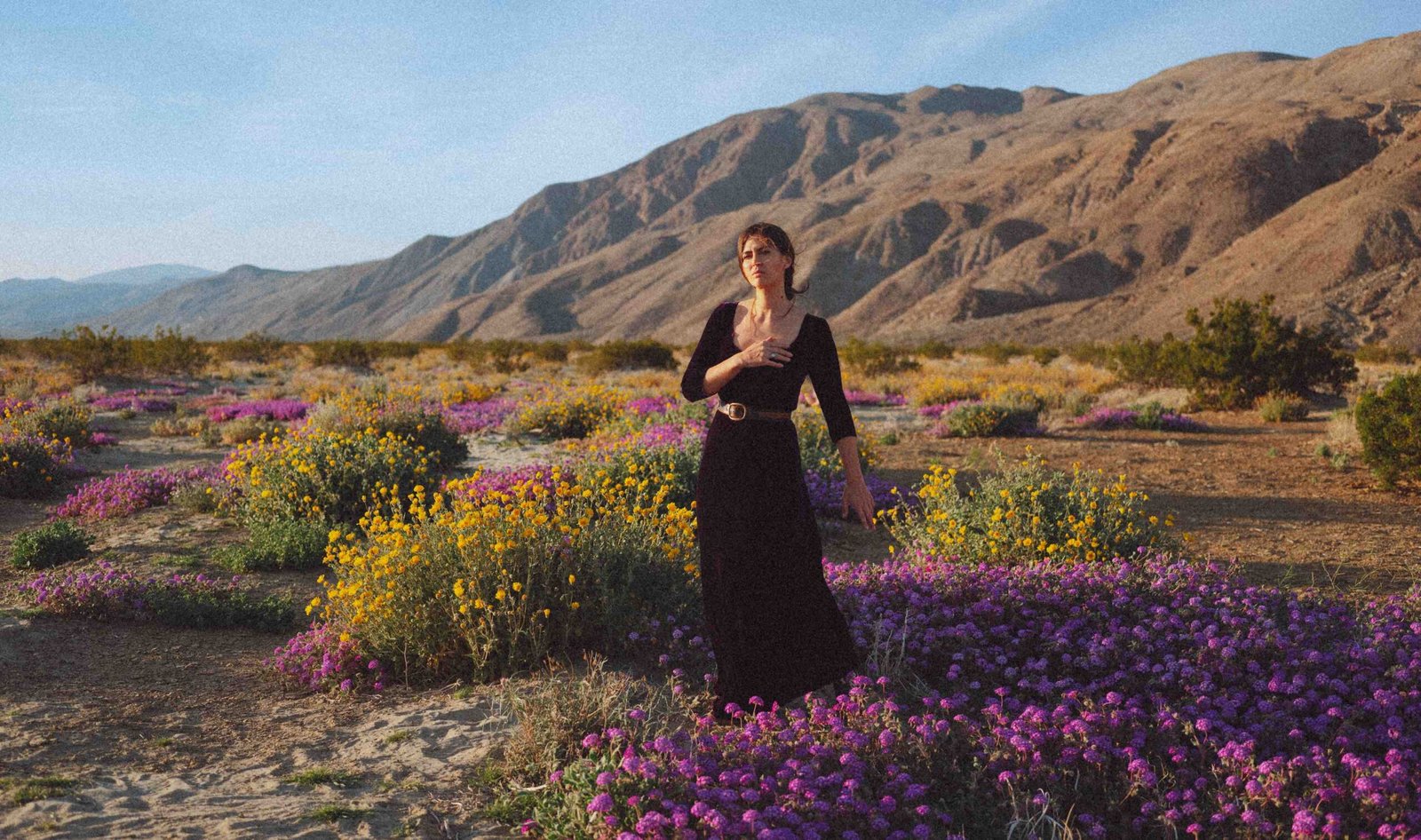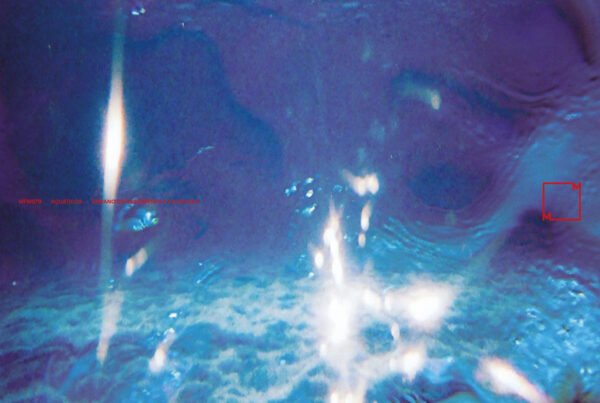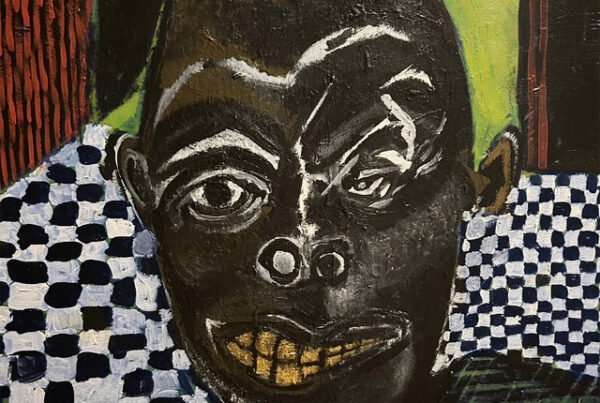Vera Sola‘s sophomore album is a haunted collection of folk- and blues-infused rock songs built around the artist’s evocative lyrics.
Release date: February 2, 2024 | City Slang/Spectraphonic Records | Facebook | Instagram | Website
I hadn’t heard of Vera Sola before the December announcement of her sophomore album, Peacemaker, along with the release of its third single “I’m Lying”, but that song and the album’s beautiful artwork immediately flagged it in my mind as one the releases to most look forward to in 2024. In the photo that adorns the record’s cover, Vera —wearing an elegant red and white dress— leans forward in a simple chair, her head tilted to the side and back, and her arms held outward in a dramatic pose. She sits within what looks like a house under construction, the wall to her side composed only of thin wooden beams behind which an arid mountainous landscape rises in the background; these beams also cast stark shadows across Vera’s body and the back wall and floor of the structure. The picture is absolutely stunning and, although I didn’t know it at the time, it captures the album’s theatrical energy in a truly poignant manner. In any case, with “I’m Lying” playing on repeat, I rang in the new year with February 2nd marked in my calendar as a day of great musical joy.
February 2nd came along and it turned out not to be such a joyous day, as a romantic breakup days earlier impeded me from completely devoting my heart to the haunting and beautiful Peacemaker, which I listened to on my way to work. However, the dramatic flare of the album became apparent to me immediately, as first “Bad Idea” and then “The Line” evoked visions of Vera as an entertainer on stage, the audience completely enthralled by her sultry voice and masterful storytelling. Together with that performative effect, the instrumentation on these two opening tracks give the impression we are looking on a scene from the past, as if an ancient, sun-bleached picture came to life.
Acoustic guitars, double bass and strings are the musical wings on which Vera Sola‘s voice soars as she instigates arsonist liberation fantasies (‘So say, come and spark up the forest / Outlay the twilight, her glow / Make way for the dark to set us under / Our city by the ashes, overthrown’). On this slow-burner (no pun intended), I imagine Vera gliding across a rugged stage —imagine the Beau Is Afraid theater-in-the-woods section— flanked by cheap wooden cutouts that catch fire throughout her performance. Electric guitars enter the fray on “The Line”, although their dangerous buzz doesn’t topple the haunted past the music is creating; they crack like lightning around the constant rhythm section, whose intensity increases constantly throughout the song, eventually reaching frantic levels alongside Vera’s excited vocals by the song’s explosive end. Here it’s easy to picture Vera and her band, clad in fancy attire as they go batshit crazy on stage, whipping the audience into a similar frenzy.
One of the true standout moments of the album —and one of my favorite songs of the year— arrives early in the form of the already mentioned “I’m Lying”. Its slow beginning is like an auditory sunrise, a gentle and rich drum pattern ushering in the light of bright guitars. The song is stunning in how gracefully each of its individual instrumental lines unfurl into intertwining patterns, like the sun’s rays bathing the clouds and landscape in its glow. This wistful opening section, four verses separated by a brief but lush instrumental break, envelops the listener completely throughout its 2:30 minute duration, which makes the shift to the excited chorus so much more impactful.
Both of these sections are absolutely enrapturing, buoyed by the supple music and punctuated by Vera’s voice and lyrics: she imbues her singing with a air of vulnerability that sets it apart from the sensation of dramatic artifice on the previous tracks (by which, I must make clear, I don’t mean to imply they’re emotionally inauthentic; quite the contrary, their lyrics are masterfully crafted to cause an emotional reaction even as they give you a knowing wink, as if saying ‘Behold that this is fiction, and yet you are defenseless to the stirring of your heart’). The song closes out with two more renditions of the chorus, interspersed with gentle sections, and Vera ends by casting a playful flicker of doubt over the un-love she professed throughout: ‘I’m lying… Or am I’?
After the thrilling “Get Wild”, which again draws us back to a stage from a bygone year, “Desire Path” and “Waiting” envelop us in a more cinematic tapestry. “Desire Path” begins with unassuming acoustic guitar strumming and a melodious bass line, and Vera enters singing softly about someone who seems to do as they will, as they run across the grass pretending it’s the sidewalk. But while the music continues in this placid direction, with new instruments adding more blissful layers to the affair, there is a turn of the screw in the lyrics, as windows are confused for doors, and the speaker crawls along the floor. It’s a shift that might not be immediately evident, but whose contrast is sharpened even more during the chorus, where stirring strings buoy Vera’s pleas for confirmation of love, closing with the chilling ‘Piss on my back and tell me it’s rain‘.
As the extent of her manipulation becomes ever more apparent (‘No it’s not my mind / I see you flicker, flicker the lights / And it’s no disease / I see you f-f-f-fucking with me’), the music also begins to unravel, its spiraling nature becoming apparent as the song bursts into an insane synth-led section that ushers in a slow fade-out. “Waiting” tells the story of a lover leaving, a bittersweet event that, in spite of of the pain of being alone, is the best course of action for the speaker, who had spent so much time waiting for him even as he was supposedly still by her side. The song evokes the scene with such splendor, a black and white, slow-motion scene so vivid you can see the grain on the film.
Throughout Peacemaker, Sola —who has a background in literature that shines through in her lyrical prowess— weaves fire and light into the songs as recurring images, and love appears to be the theme that bridges many of the album’s songs: impassioned love at times, obsessive at others, or twisted, or unjust, or mean, or gone and sorely missed. Be it on the more somber cuts —like the haunting “Bird House”, “Is That You?”, or the brilliant closer, “Instrument of War”— or during the more exhilarating moments —be it the already mentioned “The Line” and “Get Wise”, or the explosive “Blood Bond”— Vera Sola and her collaborators have crafted a collection of haunted songs that seem almost physical in their power to evoke the vivid scenes crafted by Sola’s storytelling prowess.
Artist photo by Wyndham Garnett







One Comment